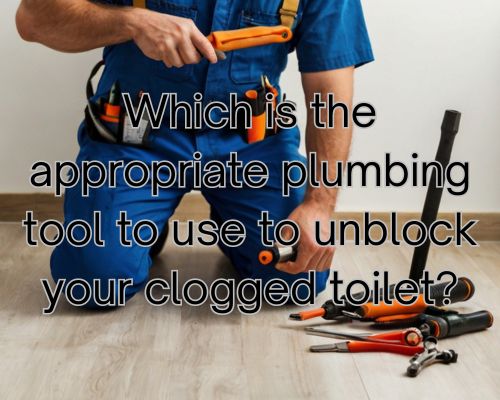“Are you struggling with a blocked toilet and wondering which plumbing tool to use to unblock it? You’re not alone. A clogged toilet can be a frustrating and unpleasant experience, but the good news is that there are several plumbing tools available that can help you unclog your toilet quickly and easily.” said Dean Owens of Plumber Warragul.

The appropriate plumbing tool to use to unblock your clogged toilet depends on the severity of the blockage. For minor clogs, you may be able to use a plunger to clear the obstruction. However, if the blockage is more severe, you may need to use a plumbing snake or auger to remove the obstruction. In some cases, you may even need to call in a professional plumber to help you unblock your toilet.
In this article, we will explore the different plumbing tools that you can use to unblock your toilet and provide you with some tips on how to use them effectively. Whether you’re dealing with a minor clog or a more severe blockage, we’ve got you covered. So, let’s get started and learn how to unblock your toilet like a pro!
Identifying the Right Tool for the Job
When faced with a clogged toilet, it’s important to have the right tools to tackle the blockage effectively. Here are some options to consider:
Plungers: The First Line of Defence
A plunger is a common tool used to clear clogs in toilets, sinks, and drains. It works by creating suction and pressure to dislodge the blockage. A toilet plunger is specially designed with a flange that fits snugly into the toilet bowl to create a seal.
To use a plunger, first, make sure there is enough water in the bowl to cover the plunger’s rubber cup. Then, place the plunger over the drain and push down and up rapidly to create suction. Repeat this several times until the blockage is cleared.
Plumbing Snakes and Wire Hangers: Tackling Stubborn Blockages
If a plunger doesn’t work, you may need to use a plumbing snake or a wire hanger. A plumbing snake, also known as a drain auger, is a long, flexible cable with a corkscrew-like end that can navigate through bends and curves in the pipe. To use a plumbing snake, insert it into the drain and turn the handle to push it through the blockage.
A wire hanger can also be used as a makeshift plumbing snake. Straighten out the hanger and bend one end into a hook. Insert the hook into the drain and twist it around to break up the blockage.
Alternative Solutions: DIY Fixes and Natural Agents
If you don’t have a plunger, plumbing snake, or wire hanger on hand, there are still some DIY fixes and natural agents you can try. Hot water, vinegar, baking soda, detergent, and Epsom salt are all common household items that can help dissolve and break up blockages.
To use hot water, simply pour a pot of boiling water into the toilet bowl. For vinegar and baking soda, mix equal parts of each and pour the solution into the bowl. Let it sit for a few minutes before flushing. For detergent, add a few squirts to the bowl and let it sit for a few minutes before flushing. For Epsom salt, add a few tablespoons to the bowl and let it sit for a few hours before flushing.
Preventative Measures and Maintenance
Regular Cleaning and Maintenance
Prevention is always better than cure, and this is especially true when it comes to your plumbing system. Regular cleaning and maintenance can go a long way in preventing toilet clogs and other plumbing issues.
One of the most important things you can do is to clean your toilet regularly. Use a toilet bowl cleaner and a brush to scrub the inside of the bowl and remove any buildup that may be present.
Another important step is to properly dispose of sanitary products, such as cotton balls, cotton swabs, diapers, and other items that should not be flushed down the toilet. These items can cause blockages in your plumbing system, leading to gurgling sounds, slow drainage, and other issues.
Proper Disposal of Sanitary Products
To prevent clogs, it’s important to dispose of sanitary products properly. This means throwing them in the garbage instead of flushing them down the toilet.
You should also avoid flushing inappropriate items, such as food particles, down the drain. These items can accumulate in the trap and cause blockages.
If you have hard water, you may also need to take additional steps to prevent clogs. Hard water can cause mineral buildup in your plumbing system, which can lead to clogs. Installing a water softener can help prevent this issue.
If you do experience a clog, it’s important to address the issue promptly. You may be able to fix the problem yourself using a plunger, hot water trick, or enzyme cleaner.
However, if the clog is severe or you are experiencing other plumbing issues, it’s best to call a professional plumber like Plumber Warragul, to address the problem.